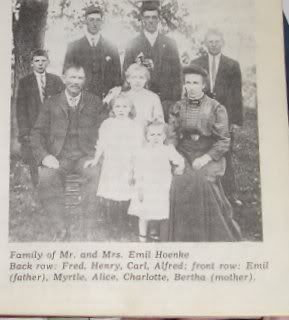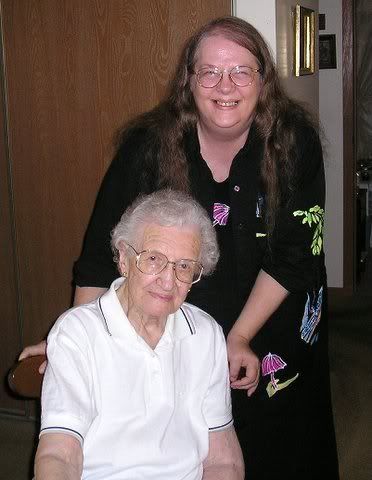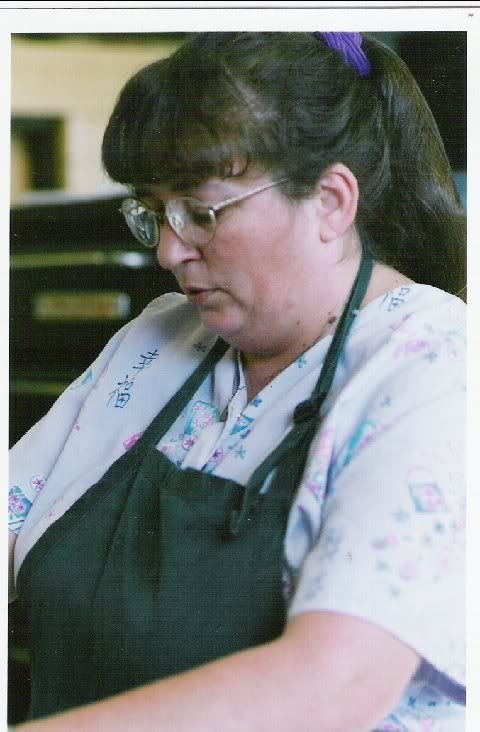Ok, ok ... we're off to a good start

Ok, me again …We’re back … the time is 1:11 pm and we’re done reading the couple of chapters. It was really really nice outside … It’s like 75 now with gusty breezes. We tied our hair back and all was good. The morning we have such nice shade in front, but it is later now and we’ve turned on the AC. We had a banana for lunch, but we’d had a big breakfast from the leftover Chinese. V’s still not here, but our sweetie pie had signed on and off and left me a note. He’s ok, we’re ok … just got a little scary. I appreciate what he is trying to do with his life, and as long as I’m in it, I’m pretty determined to be ok with his choices. So, that is enough of that!
He did say something last night that is soooo good, I haven’t been able to handle thinking of it yet, for fear of it not happening. But, I can’t hold allll these secrets! You know me by now. Our friend said, he wasn’t sure, but he might take me to my Grandma’s next month. I hadn’t asked for anything like it so it compounded the subdued elation. I was afraid to breathe in consideration what might come up between now and then. I think he has a few things to check on then he said he’d be able to tell me what to expect. Nothing has been set firmly, and I have to be ready in case we can’t do it. It makes me sooooooooooooooo happy though.
We talked a little last night of being able to let my Grandmother go when the time came. I think it is going to be pretty hard thing to do, but I know what he is getting at too. We didn’t do so well with both father and his Sandy dying within 3 months of each other. I made it through the first, but by the second … it had been too much and we needed to be hospitalized a couple of months. Thinking of death also brings up thoughts on if something happened to our friend. We keep going back over the same things like being able to sit through the funeral without getting hysterical, or if he were in the hospital, not being able to visit him. These kinds of things are likely to drive us crazy, although he assures us wholeheartedly that nothing is going to happen to him. You must by now know our capacity to worry. But, then on the other hand we can visualize the calming affect of Dr. M., our friend, V, and the boys. It may or may not have something to do with them all being male, but I’m pretty sure they all like it better when we take things more calmly. Trying to be ok. Ok, let’s think of something more pleasant.
Like we know our fishy-face is most likely in his garage sorting out the lures, which always seem to need sorting out! Hehehe How could they make such a mess of themselves!??
(Brehm, Kassin & Fein, 2005).
We think we have to get back to school now … it’s about 20 minutes later and the work isn’t getting done by itself. We are going to need to remember how to write a paper, but we are going to need doing it by inserting some of the new rules. I think I’m going to pop in over at school for a moment to get the first paper’s requirements down exactly.
Paper …
Topic: u01d1 History Date: July 9, 2006 9:59 PM
Subject: In response to assignment from Ann Author: Garvey, Ann
Last edited on: July 9, 2006 10:12 PM
Social psychology research has changed dramatically throughout history, but knowing its history, we can better understand the direction for future research in the field. Prior to the advent of social psychology, formal experimental studies did not occur that would link social experience to the individual. Later social psychology would segment into a new era as affected by two factors. The first was World War II and the second was the gathering of prestigious psychologists studying social aspects of psychology (Brehm, Kassin & Fein, 2005). Further along, the work of one psychologist led to another era where ethics were called dramatically into play leading social psychology experiments to become more formal, accurate and re-testable. Into the 21rst century, the advances of technology have ushered us into the latest era where distinctions can be made between the mind, brain, and motivation, the bodies functioning through behavior and emotion, and the individual's multi-cultural background supporting whether or not society can learn to function well together.
Stepping back 125 years ago, we find the first era of social psychology as having been created by Triplet who tested whether or not bicyclists performance times changed due to social influence and 30 years later, further work in the field led social psychologists to writing their first textbooks of social experience. (Brehm, Kassin & Fein, 2005). Social science was not recognized early on as noted by its exclusion by the Nobel Prize Committee, which rewarded other fields of physiology/medicine, chemistry, physics, literature, peace; and 70 years later the field of economics (Benjamin, 2003). This could have led many students to educating themselves in the other fields rather than psychology. One positive aspect of psychology having been considered a lesser science was the usability of psychology for the common man and parlor. People at that time were paying more attention to Freud, psychoanalysis, hypnosis, and the curvature of bumps on one's head.
Throughout the second era between the 30's and 50's, social psychology had grown through its practice and influence on enlisted people in the services and civilians by bringing better understanding to suffrage, chaos and propaganda created by Hitler. (Brehm, Kassin & Fein, 2005). In addition, a social psychology agenda was formed by the advent of Alport's "Society for the Psychological Study of Social Issues" (2005), and during this time period Lewin contributed formal attention and direction of social psychology to society and the individual, which contrasted the work of sociology, which studied groups of people. America seemed determined to contribute to a world effort, but it was also committed to taking care of its own. The war seemed to have an affect on people in the states working together toward common good and it seemed to contribute to more people creating workable policies and procedures. The individual, family, and community appeared to benefit programs of social concern and voiced a belief in their future through the election of John F. Kennedy to presidency and installation of the NASA space program.
The next period of time for social psychology began in the early to mid-60's after the untimely death of President Kennedy to the end of the 20th century. To initiate this change attention in social psychology focused on an experiment that was absurd enough to catch the public and professional eye. Milgram performed a social psychology study on "authority over individuals" where the individual was pushed to cause great simulated pain to a supposed victim (Brehm, Kassin & Fein, 2005). At that point, psychology lurched into a new era where experiments and research needed to consider the dynamics of ethics and enforcement of regulations. Through this effort, there were new levels of accuracy met through the experimental regiment of tests and retests and research practices of self-critique and criticism. Kendler (2002) a psychology historian from the University of California, Santa Barbara concerned with methodology and ethical/social policy wrote about a symbiotic relationship "created from the interaction of democracy, natural-science psychology, and moral pluralism."
No longer did it suffice that one psychologist could enter a grand theory that would cover all of psychology, nor could any psychologist maintain standards outside the American Psychological Association.
The end of the last century into the 21rst century, social psychologists have followed the well-being of individuals in their unique social roles through work on emotions, cognition and motivation (Brehm, Kassin & Fein, 2005); this was in deference to the work that had been completed in year's past on behaviorism, but, in collaboration with advances made in biology, genetics, and neurology. Further social psychology work has been and will be completed through the usage of fMRI's, PETs, and other modern medical miracles. Though, most likely the largest direct influence on society has been computer technology in all professional fields and personal home usage. The Internet has brought people together and created new avenues of thought and direction for social psychology and the world through multi-cultural awareness and availability of research means and methods such as those found through universities, meta-analysis, and research libraries. Most individuals don't receive the immediate results of understanding or viewing how their cells perform, chromosomes line up, or synapses occur, but having hospital tests performed is fairly common. This enables individual diagnosis of medical or psychological problems often before they overtake the individual when interventions can still be made with pharmaceuticals, surgery, therapy, etc. In addition, through the study of people with abnormal conditions, social psychologists can better pinpoint how discrepancies through the mind or behavior affect all people.
Although it is difficult to say where, what, and how social psychology is going to affect individuals in the future, we are able to foresee goals that people within many societies would like to see accomplished, such as how to better utilize helping behavior over anger. One example of a study that would be very timely now toward the future is how people handle the necessary changes toward energy consumption and global warming (Archer, Pettigrew & Aronson, 1992). Within a week's time, the cost of gas at a local gas station in this researcher's home town has elevated 8.5% equating to an allowance of about 250 miles of travel at the cost of approximately $40. This lasts this researcher about a week's transportation allowance primarily just from home to work. In the meantime, it can be appreciated that this researcher's salary did not include the cost of transportation increases such as this, especially since there is no end in sight as to when the costs are going to stabilize. We know that the cost of gas and energy affect many other heating factors and we know that the problems we are facing are being faced by the entire nation and international community. How society handles this extra stress will need to be studied in order for us to proceed with our normal day to day goals and objectives with any element of success. One variable is for certain and that is we have less money to spend in both our businesses, which pay our salaries, and at a home as we attempt to pay the bills. This is compounded when we include multi-cultural factors. As a case in point, this researcher is fairly sure that people of lower economic status living within the big cities, such as the people I serve at work within the poorer south side of Chicago, have to face the highest inter-city gas bills and largest inefficiencies of energy loss in their homes through poorer maintenance than those who can afford better maintenance. This is going to become, we believe a problem that might burst at the seams, particularly because the phenomena affects racial geographic neighborhoods . The timing of social psychology studies involving areas of tolerance, aggression, and altruism will become very important to the next generations. Personally, we see the greatest asset of social psychology to be in the collaboration of people networks in control of themselves working together to problem-solve world issues.
References
Archer, D., Pettigrew, T. F. Aronson, E. (1992). Making research apply: High stakes public policy in a regulatory environment. American Psychologist, 47, 1233-1236. Abstract retrieved July 9, 2006, from EBSCOhost database.
Benjamin, L. T. (2003). Behavioral science and the Nobel prize: A history. American Psychologist, 58, 731-741. Abstract retrieved July 9, 2006, from EBSCOhost database.
Brehm, S. S., Kassin, S. & Fein, S. (2005) Social psychology (6th ed.). Boston: Houghton Mifflin.
Kendler, H. H. (2002). A personal encounter with psychology (1937-2002). Abstract retrieved July 9, 2006, from EBSOhost database.
End Paper …
Wellllll … it’s been a long day, but a successful one … a minor paper, but an entire paper was written … and as a special treat … not only have we made the first deadline, we were the first to get the paper in and out of the way. The first paper is usually the nerve-wracking one. Pshwoo. I just want to say I appreciated doing what I did tonight, and I think the new paper strategy has improved what was eventually written. I’m by no means perfect at it though. There were some extra sentences and we completed an outline from the book rather than from our research work. That was still more of an after thought, well sorta … It really did make a nice difference within the paper as we went along. I’m going to see if I can get the recordings and this to log on the blog before going to bed. I say this in full awareness I am being scolded for my late night hours from Missy The time is now about 10:30 pm and I figure the video’s together took about 7 hours of time. Pshwoo long day!
(Videos by the morning!)
The first video is 5 hours and 51 minutes.
The second video is a slight 57 minutes. Hehehehe
This is the second of two videos, but the first is almost 6 hours and it turns out that I can only load about 2 hours of video at a time. We'll try again ... No doubt of that! This particular video completes the work of our first paper for Social Psychology. YAYYY!
Nitey-nite!
















